How can you actually live sustainably? We have not heard phrases such as "it's up to us" or "it's up to us now" in relation to the large Environmental problems of our time - especially from politics - heard often enough.
So how can each and every one of us make our own everyday lives environmentally friendly in order to really do something for our planet as effectively as possible? The concept of sustainability is so broad that it's often hard to know where to start. Right? In the meantime, I have been dealing with the topics of environmental protection and sustainability for over eight years and have learned a lot.
In this article I would like to explain to you why sustainability is so incredibly important and with which simple tips & tricks you can live sustainably in your everyday life. Let's go!
Here is an overview of the classic everyday areas for you, in which there is usually an incredible potential for more sustainability:
What does sustainability mean in everyday life?

Before we move on to the tips, I would like to explain some important basics here. What do we actually mean by sustainability? In the Duden dictionary, the term sustainability is defined by the words "longer lasting effect" described.₁
The Three-pillar model of sustainability is intended to promote sustainable action and divides the term for this into ecological, economic and social sustainability.
In relation to this, the word sustainability means to me personally that I reconcile these dimensions as well as possible should, in order to make my own everyday life more sustainable and to ensure that future generations of all living beings can also live on this earth.
But where do you start? Here are some examples of questions that should help you find your way around:
- Ecological sustainability in everyday life: How do I get to work in the most environmentally friendly way possible? Where does my electricity come from? How can I reduce my plastic waste in the kitchen?
- Economic sustainability in everyday life: How do I make my food last as long as possible? What do I have to pay attention to so that my clothes last as long as possible?
- Social sustainability in everyday life: To what extent do I currently contribute through my lifestyle to the World hunger with? How can I recognize fairly produced products?
Counteracting environmental problems through sustainable lifestyles
Living as sustainably as possible for each of us is the critical piece of the puzzle to solving the biggest problems of our time. These include, for example:
- climate change
- Plastic waste in the environment
- World hunger
- species extinction
- Overfishing of the seas
- Deforestation
- Soil erosion
- air pollution
- Water shortage
All these problems are man-made. Accordingly, we are the only living beings who can do something about them.
"We are living in dangerous times. Men control nature before they are even able to control themselves."
Albert Schweitzer (more at Albert Schweitzer Quotes)
Everyone can do many different things in their everyday lives to help protect animal and plant species and make the air we breathe cleaner. Or to ensure that less waste ends up in nature and that no more food is wasted unnecessarily.
Tip: Why we should live sustainablyI have answered this question in detail in a separate article.
The 17 United Nations Sustainable Development Goals
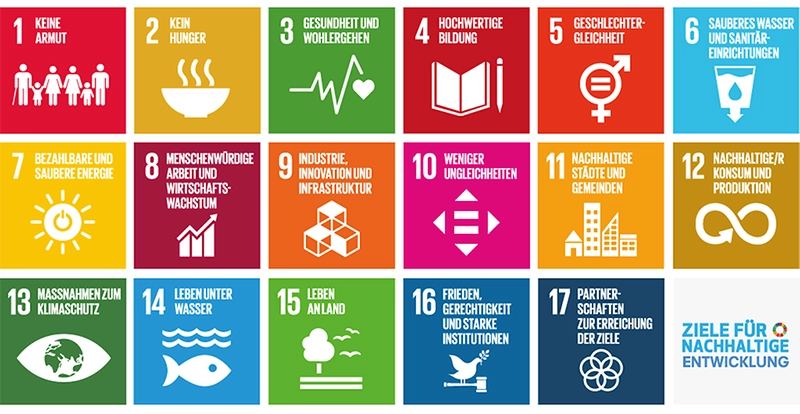
With the Sustainable Development Goals (SDGs for short), the United Nations has set political targets for sustainable development that apply to all countries on this earth. The German government has also agreed to them.
The following goals have been set - and each individual can contribute to their achievement through his or her personal lifestyle:
- No poverty
- No hunger
- Health and well-being
- High quality education
- Gender Equality
- Clean water
- Affordable and clean energy
- Decent work
- Industry, innovation, infrastructure
- Fewer inequalities
- Sustainable cities and communities
- Sustainable consumption
- Climate protection measures
- Life under water
- Life on land
- Peace and justice
- Partnerships
Measuring your own sustainability with an ecological footprint
So now we know that sustainable living makes more than sense from an environmental, economic and social perspective. In the end, everyone really does benefit from a consciously sustainable lifestyle. But how can you roughly estimate how sustainably you actually live?
As Indicator for your personal, sustainable behavior serves the so-called ecological footprint. It indicates how strong the natural resources of the planet and its ecosystems are stressed by your lifestyle. With the help of your logically honest information you can, for example calculate here.
Living sustainably and mastering the household

Now I'd like to give you the promised 50 tips that will make your everyday life a bit more environmentally friendly in all classic areas. It's not about implementing everything at once and perfectly. First learn about the things you can do to help solve man-made environmental problems - and then try to put the advice into practice step by step.
Especially in the home, we can draw from a wealth of resources when it comes to living more sustainably. Here are some tips that should help you.
1. fill up washing machine & dishwasher
Depending on model Washing machines and dishwashers consume vast amounts of energy and water. Therefore, they should be really full, so that the water and energy consumption pays off both for the environment and for your wallet.
2. wash at low temperatures
The hotter the laundry, the higher the energy consumption. While the 90° wash cycle is available on many machines, if you want to wash your Washing laundry sustainably you should do without it if possible.
Tip: You should also avoid pre-washing and, if possible, air dry the laundry after the wash cycle. How you can be as sustainable as possible
3. switch to a green power supplier
The electricity you use in your home may come from polluting coal or nuclear power. To avoid the climate change it is worthwhile to switch to green electricity, which is generated using renewable sources such as Wind, sun or water is generated.
In just 5 minutes you can now here a green electricity comparison on a comparison portal* and purchase environmentally friendly electricity.
4. use all-purpose weapon sodium bicarbonate
In the household can be the all-purpose Baking soda for example as DIY oven cleanerIt can be used as a bath additive or even as a pipe cleaner. Since you get the agent in paper, you do not make unnecessary plastic waste and replace very many household products from the drugstore.
Tip: Learn more about it in the article about the best Applications with sodium bicarbonate.
5. make dishwashing liquid from ivy itself
For several years now I have been making my Hand dishwashing detergent from ivy leaves itself. Ivy grows in every corner at any time of year and contains Saponins, which provide natural foam in a short manufacturing time. Just give it a try!
6. build furniture yourself or buy used
You think you're not talented with your hands? Even then, it's no problem for you to work on simple DIY nightstands from old oak planks to try. So you can Material upcycling, which may have been stacked in the corner for several years and avoid unnecessary waste by packaging new furnishings.
Besides, it's worth it, unique pieces of furniture buy used. So you can Save money sustainably and preserve nature.
Tip: Just look around a bit in the DIY Furniture Blog um. For example, I have a Dining table self made and explain to you there how exactly this works.
7. sowing flower meadow and mowing lawn less often.
By not mowing your lawn every week, but "giving nature a bit of a leash." you promote biodiversity in Germany. Because where there are more insects, there are more birds. Make your garden a Mecca of biodiversity. Do away with the noise and fuel of the lawnmower and instead enjoy your time in the peace and quiet. Natural garden with birdsong.
Here you will find the corresponding, further blog articles:
Tip: In my book Sustainable living for beginners I'll show you in more detail, calmly and step by step, how you can make your everyday life more environmentally friendly. Here you get it*. Have fun reading!
Sustainable shopping in everyday life
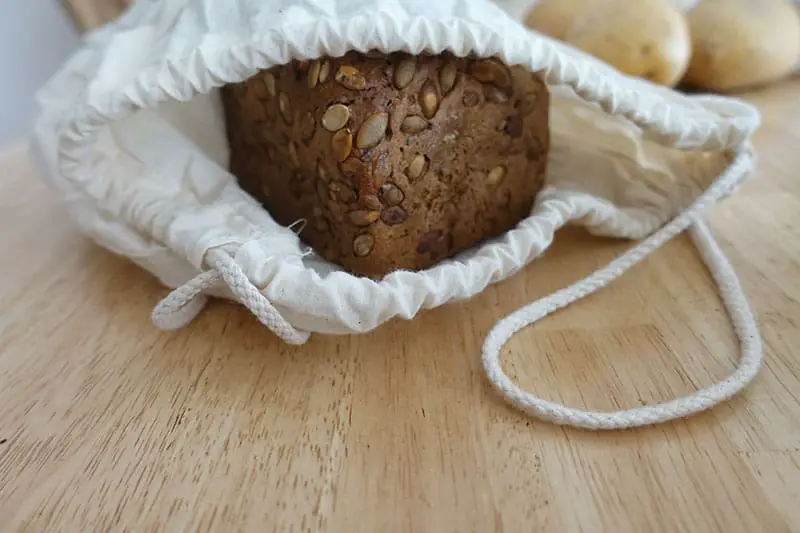
Nowhere do you produce as much waste as when you go shopping. What's more, you usually buy more than you actually need. So there's a lot of potential for making our everyday lives a little more sustainable.
8. shopping with cloth bag or backpack
Nowhere generates as much plastic waste as regular grocery shopping. There are many unnecessary plastic packaging such as Plastic bags, which can be sustainably replaced by using a forever reusable and washable jute bag.
Alternatively you can also simply use a Basket or backpack go shopping. A first, big and important step towards an environmentally friendly and plastic-free shopping as much as possible - completely in the sense of the Zero Waste Lifestyle.
Tip: I can warmly recommend the GOT BAG Backpack recommend You can order it here*.
-
Backpack139 €
-
Fruit and vegetable nets10 €
-
Stainless steel lunch box17 €
9. use fruit & vegetable nets instead of plastic bags
Through the acquisition of Fruit and vegetable nets it really is incredibly easy to avoid waste in the supermarket. Do you still remember the thin, free plastic bags in the fruit and vegetable department? With these networks* you'll never need them now.
10. avoid microplastics & palm oil
Microplastics in the sea is one of the biggest problems facing the ecosystems of ours. It arises mainly from the Decomposition of large plastic partsbut also enters rivers and oceans through our cosmetic products. Unfortunately, sewage treatment plants have difficulty filtering out the particles.
And for the Generation of Palm oil is destroyed rainforestsimply because it's in thousands of items we buy and consume every day.
Please use the App CodeCheckwhich you can use to scan a shower gel, for example, to find out in seconds whether it contains such questionable, environmentally harmful substances.
11. plan purchasing according to demand
A more than sensible tip for living more sustainably is to specifically Reduce your personal food waste.
Make an accurate Shopping plan with the things you really need. For example, check your supplies carefully beforehand so that you don't end up with too many bananas or kiwis that you might not be able to eat all before they go bad.
In this way, we reduce the problem of around 78 kg of food ending up in the trash per capita in Germany every year.₂
Setting an example of sustainability in the kitchen
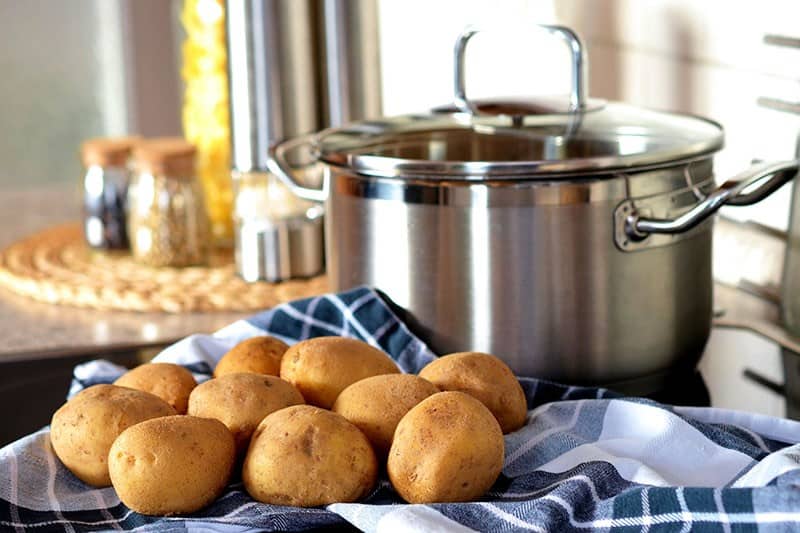
In the kitchen, a lot of energy is consumed and a lot of waste is produced. Here, too, there is a lot of potential to make your life even more environmentally friendly.
12. use metal coffee filter instead of paper
There are Stainless steel coffee filter, with which you can bypass unnecessary waste from paper disposable filters. Simply wash off and reuse again and again.
Disposable coffee capsules in particular do not belong in a sustainable everyday life. They generate around 8,000 tons of plastic waste every year. What's more, you're also paying the equivalent of 70 euros per kilogram of coffee.₃ You certainly wouldn't spend that without this industry marketing ploy, would you 😉 .
13. cook with lid on the pot
If you want to boil water in the saucepan in an environmentally friendly way, then you should put a lid on the saucepan. This way Less energy required and the water gets hot much faster. Use this simple tip to make cooking in the kitchen more sustainable in the long run, and your Reduce electricity costs.
14. let dishes cool down before putting them in the refrigerator.
Normally, you'd probably put a hot meal in the fridge right away so you can still enjoy the rest the next day. In principle, that's a good idea - but for the sake of sustainability, you should let your food cool down first so that the Refrigerator requires less energy to maintain its set temperature.
15. use residual heat from stove and oven
Both stove tops and ovens still have a certain amount of residual heat after they have been used, with which you can without additional energy consumption finish cooking or keep dishes warm a little longer. Use them!
16. pre-boil small amounts of water in the kettle
A sensible tip for more sustainable living is also to boil smaller amounts of water in the kettle. For example, for the preparation of a portion of pasta. Boiling in the kettle consumes significantly less energy. Only with larger amounts of water is it worth boiling in the saucepan - and then you can again Save energyby placing a lid on the pot.
17. use washable kitchen towels
Do you want in your everyday life Save paperto become even more sustainable? Then you can say goodbye to your paper towels in the kitchen, because they can be easily replaced by equally absorbent, but reusable cloth towels Replace
Nutrition tips for sustainable living
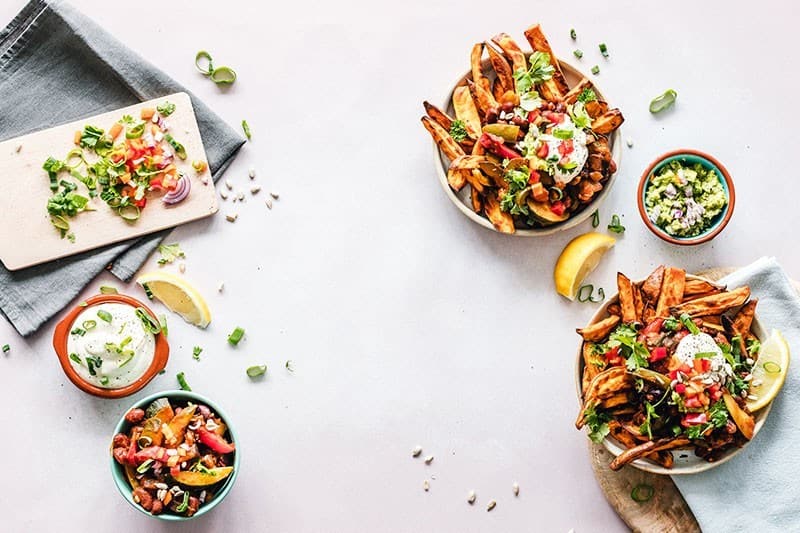
If you want to live sustainably, you can't avoid the topic of nutrition. This should be sustainable for your own body but especially for our environment. Here you get the best tips for a sustainable diet.
18. live vegan or massively reduce meat consumption
Hardly anything makes your everyday life as environmentally friendly as the Abstaining from meat or animal products in general. For one kilogram of beef, a total of about 15,500 liters are actually consumed.₄ In addition, forests are being cut down for arable land for animal feed (soy meal) and cattle pastures - this particularly affects the tropical rainforest.
Through the Start into a vegan life you make your everyday life much more sustainable in one fell swoop. In addition you prevent animal suffering - as, for example, through the common practice of Chick Shredding Or the dehorning of cows. And don't worry: I've been living vegan for a few years and can still enjoy pizza, burgers, pasta and all the yummy stuff 🙂 .
I can give you matching this vegan online course* recommend. There you will get to know the most delicious dishes and recipes right from the start 🙂 .
Tip: If you want to know more about the Reasons for a vegan lifestyle you can always find them in the linked article.
19. save food with food sharing
Do you already know Food Sharing? As a member you can Save food from bakeries, supermarkets or restaurantsthat would otherwise have found their way into the trash can.
Good to know: At the time I wrote this article, Food Sharing had already successfully saved 88.8 million tons of food from the garbage can.₅
20. make food last longer
For example, by storing bread in a sealed bread box, or by reusable oilcloths (you get here*) instead of the usual plastic cling film, you can use the Extend the shelf life of food in a simple and sustainable way.
Tip: You can learn more about this in the detailed article "Making food last longer".
21. grow your own food
Whether in the kitchen or in the garden - many herbs and other plants can be grown wonderfully at home. In this way, you save on packaging waste and ensure a constant and natural supply of Fruits, vegetables and herbs.
22. drink tap water
Compare with pleasure once Water in plastic bottles with tap water. The water from the plastic bottles is not only 250x more expensive₆, but also provides for Suffering in other parts of the world. The privatization of water sources is one of the reasons that food companies like Nestlé exposed to great criticism are.
Tip: Tap water is already at your home, so you can save yourself the unnecessary lugging of water bottles. Even on the road, you can bring your own water bottle (here are the the best water bottles) at replenish. And how to fill your Make tap water more palatableI'll explain in a separate blog post.
23. give preference to organic, plant-based, regional and seasonal foods
Like foodstuffs sold here in Germany, they come from overseas. They have long and energy-consuming Transports behind them. To make matters worse, they are often high water consumption and in energy-intensive greenhouses. cultivated. The production of animal-based foods in particular is associated with high environmental costs.
Accordingly, it's advisable that you stay away from certified organic, plant-based as much as possible, regional and seasonal available foods.
Here are some further articles to this:
Book Tip: Together with Julian Hölzer I have developed the Book Cooking for the Climate authored. In it you will learn about the problems that are caused by our way of eating. In addition, we give you valuable recipes that will help you become an important part of their solution in everyday life. Here you get it*.
Sustainable living in the bathroom

We use a lot of disposable products in the bathroom these days, which creates mountains of waste. Here you get a little inspiration to make everyday life more sustainable in the bathroom.
24. showers instead of baths
Shower rather than run a bath and keep it as short as possible. Thereby you save a lot of water and especially a lot of energy necessary to heat the water.
Tip: Try also calmly more often, cold to shower. This will allow you to Strengthen defenses and also mastered the first challenge of the day early in the morning.
25. make toothpaste yourself or use toothpaste tablets
Did you know that you can also simply use a natural toothpaste without Microplastics and Without plastic packaging can use? Have a look at the How to make toothpaste yourself an.
To avoid garbage, you can alternatively also switch to Toothbrush tablets set. You can get them for example in glass or paper in the unpacked store or on the Internet.
26. use cotton pads made of fabric
You can achieve your goal of living more sustainably in the bathroom primarily by doing without disposable products. For example, makeup removal pads regularly generate masses of disposable waste, which can be disposed of by reusable and washable cotton pads can be avoided in the long term.
Best get yourself a such set with several cotton pads* so you can wash them all collected.
27. use shampoo and shower gel in one piece
Almost every week, unnatural shampoos and shower gels create unnecessary packaging waste. Therefore simply step up vegetable bar soaps um.
Here you will find a suitable Bar soap for hair* and a Bar soap for the body*. For storage you then simply get yourself a Soap bag, and an old tin can for safe transport. Ready!
Live sustainably in your free time

Of course, there is also something slumbering in your Leisure activities a great potential for more sustainable action. I've also put together a few tips that should make your everyday life a little more environmentally friendly.
28. reduce use of streaming services
Unfortunately, streaming series and movies on Netflix, Amazon, YouTube and the like is anything but environmentally friendly. The charging process consumes large amounts of energy and emits CO2 - also because the content has to be reloaded every time it is needed. Therefore, try to minimize the use of streaming services as much as possible.
At Streaming sustainability you will find a detailed article on this topic including sustainable alternatives.
29. search environmentally friendly hobbies
If you want to live more sustainably, you should choose hobbies that have as little impact on the environment as possible. Ideally, you can give them outside in the fresh air and near you without having to travel halfway across Europe.
In fact, most, classic hobbies are pretty environmentally friendly. Here are some ideas and examples:
- Read books
- Play soccer, basketball, handball
- Do fitness training outdoors with your own weight (e.g. Freeletics)
- Go jogging (Plogging is even more sustainable)
- Picnic
- Eat out
- Hiking
- …
Living sustainably, even on the road and while traveling
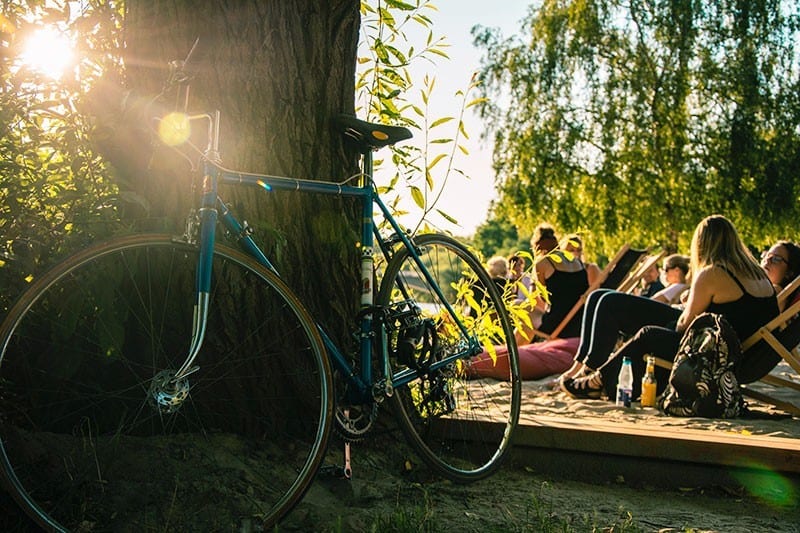
Technological progress ensures that our means of transport emit fewer pollutants. Nevertheless, most Cars and especially airplanes real environmental killers! When traveling, in commuter traffic and also in the mostly daily use of the car slumbers accordingly great potential!
When it comes to mobility, I also have a few valuable tips for you here that you can use to make your life more environmentally friendly.
30. cycling more
We humans are made to move around physically. The Cycling promotes your health and does not emit CO2. So just get on your bike more regularly and use the slightly "longer riding time" to relax.
Tips: Do you already know the car free lifestyle? Many people do without cars altogether and use more sustainable means of transportation instead. But even with a car, you can be more environmentally friendly. For inspiration, take a look at this article about sustainable driving.
31. use public transport
According to the German Federal Motor Transport Authority, the number of passenger cars on German roads has increased by almost 15 percent between 2011 and 2022.₇
For cleaner air, fewer emissions and less time in traffic jams, you should therefore increasingly use public transport such as the Train, bus, the streetcar, the suburban train or the subway or at least drive electrically. This is a very important tip if you want to live a sustainable lifestyle.
32. train & long distance bus instead of car and plane
For longer distances, you should prefer the long-distance bus and especially the train for an environmentally friendly lifestyle. There are no hidden costs like with a car and your journey from A to B is less expensive. significantly less CO2 off. According to the climate protection portal, aviation accounts for 2.55 percent of global CO2 emissions.₈
In my Book "Sustainable travel for beginners you will find more useful tips for sustainable travel. You get it here*.
Tip: It is not always possible to avoid the flight. In a separate article, you will therefore find out exactly how you can fly as sustainably as possible simply by following your heart.
33. carpooling
If you depend on your car, you can also carpool or get together through portals like BlaBlaCar connect to an existing car trip. In this way, you avoid unnecessary double trips and reduce per capita emissions of the single car trip.
Tip: Also your Commuting to work can be made more sustainableby carpooling with your colleagues!
34. drink coffee in the thermo mug you bring with you or on site
In Berlin alone, around 460,000 Coffee2Go cups are consumed every day.₉ Many people believe that the cups are made exclusively of cardboard. But in fact they are also made of plastic and are therefore difficult to not recyclable at all.
These are the ToGo cups are a disposable product that is only used for a few minutes. For a more sustainable everyday life, you should get a Coffee2Go reusable mug or enjoy your coffee on site in the café. I can recommend this mug here*.
Tip: You'll even get discounts at some cafes if you bring your own mug!
Sustainable living means being conscious with clothes

While we in Germany spent 18.58 billion euros on clothing and footwear in 1970, this figure had risen to 77.78 billion euros by 2018.₁₀
In fashion prevails the Fast Fashion! There are no longer only two collections like "spring-summer" and "autumn-winter". Instead almost every week a new trend proclaimed. Logically, this behavior has social and environmental consequences.
With the following tips I would like to make your everyday life more sustainable in terms of clothing.
35. second hand fashion shopping
Second hand clothing had a dusty, bad image for a long time. But now that the problems due to the fashion industry can no longer hide, many people are beginning to rethink.
A valuable tip for more sustainability in your everyday life is therefore to go to one of the passionately run second hand stores in your area or to buy used and still good-looking clothes e.g. at Kleiderkreisel or eBay Classifieds to buy. This way you also value the resources and the effort of making clothes immensely.
36. get well combined timeless clothes
Your closet doesn't have to be overcrowded and cluttered. Instead, you can selectively get pieces of clothing that are timeless and can be easily combined with each other. The creates overview, makes happy, saves a lot of money and Conserves natural resources in everyday life.
Tip: How to get the most sustainable closet furnishingsI explain in detail in the linked blog article.
37. exchange, sell or give away superfluous fashion
Of course, fashion is also perishable. In the spirit of sustainability, you can then swap unwanted items of clothing with others, or put them on Zero Waste Apps like eBay classifieds sell or give away. Because another person might like the t-shirt or the dress.
In this way do you value the material and the work involvedThe result is that one less garment has to be bought and produced.
38. value and care for existing clothing
Save your wallet and natureYou can do this by caring for the clothes that are already in your closet. Appreciate that you can call such beautiful, different clothes your own and remember that not everyone enjoys this "luxury problem".
Don't throw away a sweater right away if it has a hole, but learn from the sustainable lifehacks of our grandparents and just fix it.
Tip: In another article you will learn how to make each garment last as long as possible.
Living sustainably, even in the office

Your job, your office equipment, your private checking account - all these things also have an impact on how sustainable your life actually is. Here are some tips to help you manage your job, finances and documents in the most environmentally friendly way possible.
39. open a current account with an environmentally conscious bank
The money you hold at a bank may be used by the bank for its own investments. Often these investments are extremely questionable. For example, banks like Commerzbank or Deutsche Bank support the cotton trade of cotton from Uzbekistan where Child labor is the order of the day.₁₁
By creating a Account with a green bank that excludes such investments, you are on the safe side.
Tip: I have a detailed Comparison of sustainable banks made. In the linked article, you can get an idea of sensible alternatives yourself.
40. green insurance prefer
What applies to banks naturally applies to insurance companies. They, too, make investments with the money they hold from you. Take a close look at which Philosophy the respective company acts.
A really sustainable, statutory life insurance should, for example, reward a healthy, meat-free lifestyle and itself run on 100 percent green electricity. I can recommend you a Change to BKK ProVita*.
41. organize documents digitally
Manage your documents with digital folders and do away with paperwork. By creating the most paperless office you can also access your documents from anywhere, carry less around with you, and reduce the deforestation of forests for paper production.
Tip: You can also easily download bus tickets or city planners on your cell phone, for example.
42. prefer recycled paper to new paper
Avoiding paper altogether is very sustainable. But this is not always possible. If you want to do something print sustainable then you should at least use recycled paper. Also so Reuses existing resources without having to cut down another tree.
43. switch off technology completely instead of standby mode
Even in standby mode your laptop still consumes some power. If you know that you won't be sitting in front of the computer again in the next 5 minutes, then you can turn it off directly in an environmentally friendly way. This basically applies to almost all other technical devices in the household.
44. use a sustainable search engine
A search engine provides you with answers to your questions every day. But Google always stands out due to a high Power consumption, tax tricks and data storage in criticism.
There are definitely sustainable alternatives to Googlethat create additional value for our society and the environment from your daily search queries. For example, the operators of the search engine Ecosia.org a tree for about every 45th search query.
Tips for a sustainable mindset
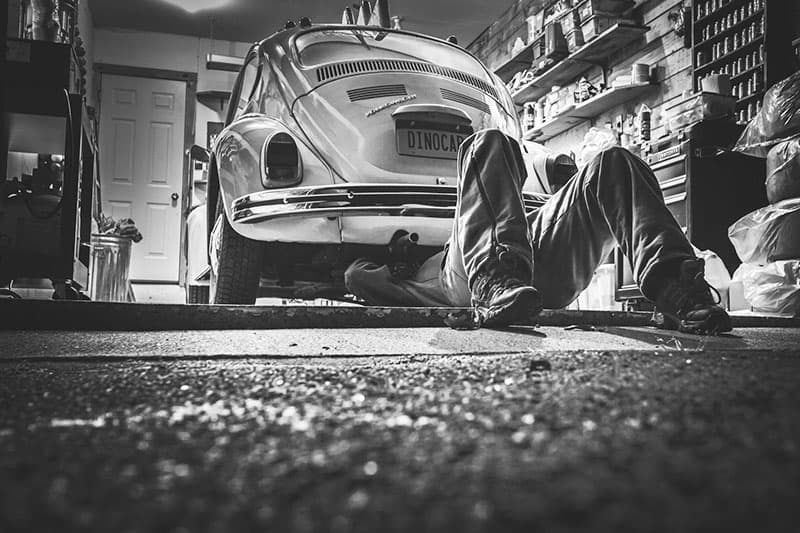
There are some things that can't be bought but still have an impact on your sustainable actions. I'm talking about your inner attitude. Now you can find out which tricks you can use to lay the fundamental foundation for a sustainable life.
45. develop interest in do-it-yourself projects
You don't always have to buy everything new! This is expensive, makes a lot of waste and you also often don't know what exactly you are getting. By doing things yourself, on the other hand, you are usually promoting the most sustainable lifestyle possible.
Here are a few things you can easily make yourself from natural ingredients:
- Make dishwashing liquid yourself
- Make detergent yourself
- Make deodorant yourself
- Build coffee table yourself
- Make glass cleaner yourself
At make sustainable things yourselfI'll give you some more ideas for inspiration.
46. reuse instead of use once
A great example of this sustainable tip is the straw. A plastic straw in a cocktail you use for about 15 minutesbefore it ends up in the trash. The Glass straw you also use for 15 minutes - however, you can wash it off after that and at the next, plastic free party reuse.
I can recommend this set with glass straws*.
At all has hardly any disposable product so many more sustainable alternatives, like the plastic straw. They are not only made of glass, but also, for example, stainless steel or bamboo wood. Reusable products are an essential key to producing less waste.
47. repair instead of throw away
Repairing is a trait that many people in our Disposable society have thrown overboard. In the process, it broadens one's own horizons and helps, Reuse existing things for as long as possible.
Therefore, try to repair as many things as possible and only buy new or otherwise replace them when absolutely nothing else can be done.
48 Questioning one's own consumption
To live sustainably, you should also question your own consumption. Do I really need this product or is this an unnecessary impulse buy? In the end, such questions will not only help you to act more sustainably, but also to save a lot of money. And be aware, Consumption does not make happy - at least not in the long term!
Just try something live more minimalist and limit yourself to the things that are really important for you, your wishes and dreams. This creates order, saves money and, above all, protects the natural resources of the planet.
Tip: Above all, try to avoid the shopping mania. And if you still want to buy one thing or another, learn, store (online) as sustainably as possible. This works for example by Avoid returns on online orders in a targeted manner.
49. don't be too shy to get involved
For a sustainable everyday life I can give you another valuable tip! Get involved! Organize a CleanUp yourself, in order to Get garbage from the environment. Whether on the beach at Garbage collection on vacation - or in the forest, on a walk with your dog. Such small good deeds are not only something for nature, but also for your soul.
Get active! You can do so much! For example, start an online petition or take part in a demonstration to raise your voice against a grievance and carry many people along.
Tip: At sustainable petitions you'll find a list of great digital signature collections that I encourage you to check out.
50. constantly learn and be open to new things
Living sustainably also means, Being open to change and new things. I can only advise you to, read books regularlyWatch educational documentaries and generally keep yourself informed about new developments.
Because also your Environmental awareness requires minor adjustments every now and then. Look at and evaluate things soberly and free of prejudice. Instead, simply think about how a new idea or development can have an environmental, economic and social impact.
Frequently asked questions about sustainable living
Why should you live sustainably?
Everyone should lead a sustainable lifestyle to solve climate change, rainforest deforestation, air pollution, plastic waste in nature and all other man-made environmental problems. Sustainable action promotes our coexistence - since everyone really benefits from it. This requires people who lead the way and exemplify sustainability.
What does it mean to act sustainably?
Living sustainably means living in such a way that this way of life could function permanently. Those who live sustainably treat the earth's natural raw materials and other resources with care, taking into account the needs of future generations.
One could also say that sustainable action means not living at the expense of nature and one's own children and grandchildren.
How can you start living sustainably?
For example, by cycling and using public transport more often instead of driving. Targeted waste avoidance, planting an animal-friendly garden, conscious consumer behavior, purchasing green electricity, and switching to plant-based meals and regional, seasonal foods can also make a real difference.
Setting an example of sustainability in everyday life, because change starts with you
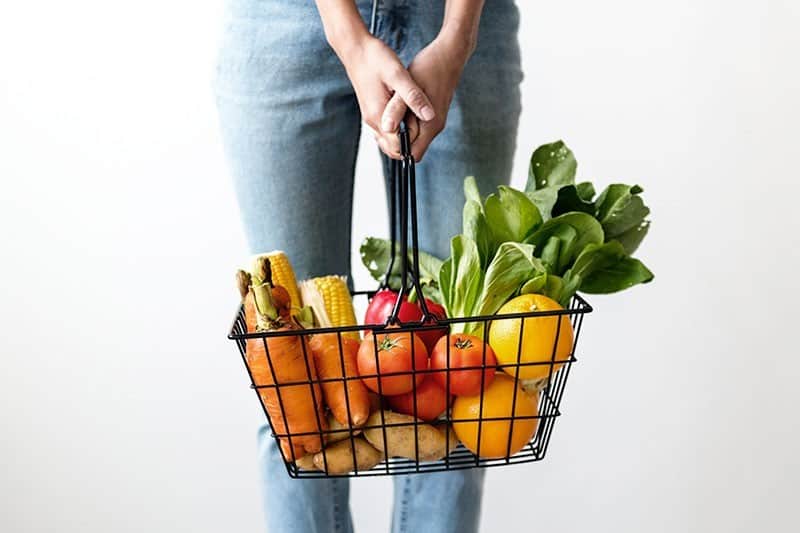
I hope that the sum of tips for an environmentally friendly everyday life has not overwhelmed you. Please consider sustainable living as a truly long-term learning process that you go through step by step.
"Be yourself the change you wish to see in this world."
Mahatma Gandhi (more at Mahatma Gandhi Quotes)
No one expects you to implement all the tips perfectly right away. But sometimes it's just good to know them at least once before and to try to do them little by little. Every step is a step forward.
Do you have any tips, suggestions or questions about this article about living as sustainably as possible? Then feel free to leave me a comment at the end of the post.
Stay sustainable,

PS: If you feel like a steady guide and more tips, then you are with my Book "Sustainable living for beginners on the safe side. You can secure it here now.*
References:
₁ Duden, Cornelsen Verlag GmbH (2023): Sustainability, available at https://www.duden.de/rechtschreibung/Nachhaltigkeit. [06.01.2023].
₂ Federal Ministry of Food and Agriculture: Food waste in private households put under the microscope (as of 10.11.2022), available at https://www.bmel.de/DE/themen/ernaehrung/lebensmittelverschwendung/gfk-studie.html. [06.01.2023].
₃ Hero Market: Advertising poster, available at https://pbs.twimg.com/media/Dr8xstuX0AEyqC-.jpg. [06.01.2023].
₄ A. Y. Hoekstra, A. K. Chapagain (2005): Water footprints of nations: Water use by people as a function of their consumption pattern, available at https://waterfootprint.org/media/downloads/Hoekstra_and_Chapagain_2006.pdf. [06.01.2023].
₅ Foodsharing e.V.: Total statistics, available at https://foodsharing.de/statistik. [06.01.2023].
₆ Trade Machines FI GmbH: PET - Das irrsinnige Geschäft mit abgefülltem Wasser (as of June 29, 2017), available at http://trademachines.de/info/abgefuelltes-wasser. [06.01.2023].
₇ Norddeutscher Rundfunk: Car density at record high (as of Sept. 15, 2022), available at https://www.tagesschau.de/wirtschaft/verbraucher/pkw-bestand-deutschland-101.html. [06.01.2023].
₈ Bundesverband der Deutschen Luftverkehrswirtschaft e.V.: Klimakiller Nr. 1?, available at https://www.klimaschutz-portal.aero/klimakiller-nr-1 [06.01.2023].
₉ BMUV: How many disposable cups are consumed each year? How many of them end up in the environment?, available at https://www.bmuv.de/faq/wie-viele-einweg-becher-werden-jaehrlich-verbraucht-wie-viele-landen-davon-in-der-umwelt. [06.01.2023].
₁₀ Statista: Consumer spending by private households in Germany on clothing and footwear in the years 1991 to 2021, available at https://de.statista.com/statistik/daten/studie/161570/umfrage/konsumausgaben-privater-haushalte-in-deutschland-fuer-bekleidung-zeitreihe. [06.01.2023].
₁₁ Spiegel Online: Uzbekistan - German firms profit from child labor (as of Oct. 23, 2010), available at https://www.spiegel.de/wirtschaft/unternehmen/usbekistan-deutsche-firmen-profitieren-von-kinderarbeit-a-724956.html. [06.01.2023].

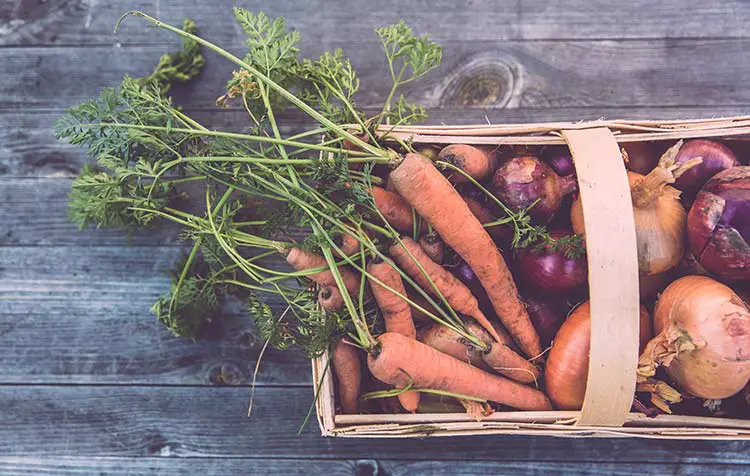

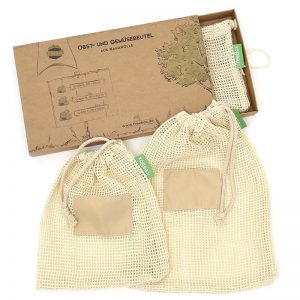
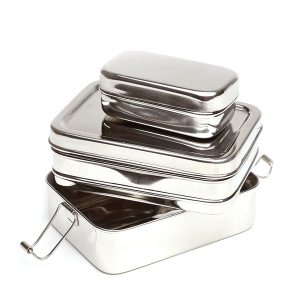











Thanks for the tips on sustainable living in everyday life. My brother recently bought glass drinking straws online and we are thrilled with how sustainable they are. Good to know that not many disposable products have so many sustainable alternatives.
Dear Christoph,
in search of tips for sustainable living I discovered your blog and have been browsing through the insanely interesting articles for half an hour. Thank you for all the inspiration! ?
Love greetings
Carina
Hey Carina! Thank you for your feedback, this motivates without end! 🙂
Continue to have fun and best regards, Christoph
Already for years I live part-organic, Greta and also the thankfully increased published reports etc. have shown me, however, that one and also I must do more. So now I have downloaded the app to check the ingredients and already purchased shampoo, deodorant, soap, etc. new. However, I often have doubts whether all the so-called improvements are really an improvement. Electric cars require batteries, which in turn require lithium. The mining of lithium, however, destroys the environment in the Andes. Where can one find out about such things without falling back into the clutches of vested interests. I don't know if I'm in the right place with my request, but I would be happy to receive tips.
Love greetings
Ulrike
Hi Ulrike! Basically, you should always get at least a second opinion to back up any statements you read anywhere. Because as you say, economic interests in particular distort the truth of certain opinions. Great, the app will be very helpful to you. Please don't be discouraged, there will always be some headwind - especially from various stakeholders. But our way is the only right way and will prevail in the long run. The market will adapt to it accordingly 🙂
Best regards
Christoph
Comments are closed.